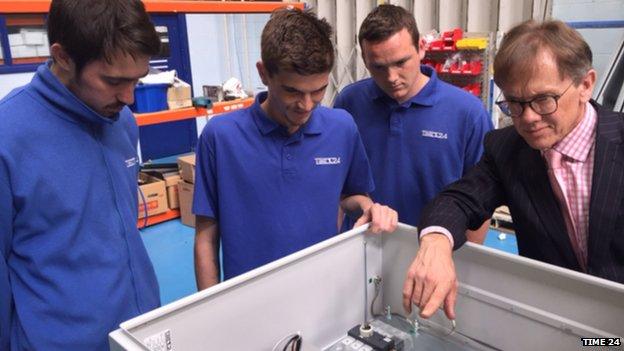Apprentices: How easy is it to create three million more?
- Published

George Osborne has pledged to use money cut from the welfare budget to create three million new apprenticeships to help young people into jobs and give a boost to UK productivity. But many people still view apprenticeships as a second-rate career choice. So will the plan work?
When Naim Hamade left school aged 18, he was painfully shy. But he won a place as an apprentice with BT, earning a starting salary of £16,000.
"I was chucked in at the deep end, but that was a good way to learn," he says.
Based at the BT Tower in London, he learned how to troubleshoot problems in the IT system and helped launch new BT channels. Now 21, he has developed the confidence he lacked.
Like his friends who chose to go to university, he's gaining formal qualifications - he's just earned a foundation degree in IT. But unlike them, he isn't saddled with large debts.
"They're quite jealous of the opportunities I get here. Not just the financial side of it, but the skills, the qualifications," he says.
For Naim, the benefits are clear, but also for employers such as BT, apprenticeships offer a way to bridge a skills gap that many identify as one of the key obstacles to growth.
Skills deficit
As politicians puzzle over the conundrum of how to improve productivity, apprenticeships are being touted as one part of the solution.
The Centre for Economics and Business Research, external puts a high estimate on their return, calculating that the economy benefits by £21 for every £1 of public money spent on apprenticeships, thanks to higher profits and wages and reductions in welfare costs.
And with more than 16% of young people out of work, finding them employment is a priority.
"We have companies absolutely crying out for people with these skills, and people wanting the routes into higher-paid skilled work," says Neil Carberry, Employment and Skills Director at the business group CBI.

Celebrity chef Jamie Oliver's apprentice programme is viewed as a success
While traditionally apprenticeships were in industries such as electronics and automotive maintenance, they're now offered by a diverse range of sectors, from accountancy to childcare. The idea is that apprentices will learn skills in the workplace alongside part-time academic study at a university or further education college.
But the government's plans to increase apprentice "starts", or new apprenticeships, from two million over the course of the last parliament to three million by 2020 may stumble thanks to the mixed reputation of apprenticeships, and the way the government plans to spread the costs.
"In the past there has been some good and frankly some less good provision," says Mr Carberry.
"The challenge is making sure we don't obsess over numbers and we talk about quality."
Verbalising specials
Recent campaigns promoting apprenticeships point to success stories: JCB chairman Lord Bamford, fashion designer Stella McCartney, celebrity chef Jamie Oliver and Laurence Graff of Graff Diamonds. Glossy photos show young people in protective clothing bent over electronics, plumbing or welding equipment.
But many parents and students remain resistant to the idea of an apprenticeship, either through lack of information or because they doubt their usefulness.

Keesha Simpson recently completed a hairdressing apprenticeship
The reality is that only a minority of apprenticeships are at a leading engineering company or fashion house. Most recent growth in apprenticeships, external has come in sectors such as office work, health and social care, retail and hospitality. And the current minimum wage for an apprentice under 19 is only £2.73 an hour.
On the government's online database, external of available apprenticeships, alongside courses for forklift truck drivers and trainee chefs, are posts for digital marketing and shoe shop assistants, many lasting only a year. One for a restaurant post suggests the candidate would acquire skills such as "offering menus" and "verbalising specials".
Keesha Simpson, who completed an apprenticeship in hairdressing, told BBC Newsbeat the low pay in particular made it a real struggle.
"Apprenticeship seemed like a great way to go, but for me personally it was very hard and very stressful. I found it depressing," she says.
Changes afoot
The government is raising the minimum apprentice wage, external to £3.30 an hour in October. The Department for Business Innovation and Skills (BIS) is introducing more rigorous standards for apprenticeships across all sectors and is planning to give employers more say over what apprentices learn off-site, through a voucher scheme allowing businesses to shop around for the most suitable course at local colleges.
In return, however, business will be expected to contribute more, up to a third of the cost of the off-site education will be required upfront, as well as the new higher wages.
While the big established companies already spend much more than that on their apprentices, the new system may not suit all employers.

"My guess is retail, hospitality, catering and social care will take one look and say 'sorry we're not taking apprentices any more'. That will make getting to the three million target much, much harder," says Prof Ewart Keep, director of the Skills Knowledge and Organisational Performance centre at Oxford University.
As those sectors employ the bulk of apprentices, that would blast a large hole in plans to increase apprenticeship numbers.
"When the new system gets rolled out and a lot of the employers say 'no, I'm not paying a third upfront', it'll be a question of who blinks first, employers or BIS. If you asked me to bet, I'd say the government will blink first."
The German model
David Shore is one of those waiting to see whether the government will blink.
He runs Time 24, a manufacturer in West Sussex supplying wiring systems across the transport, defence and medical sectors. He is thinking of taking on five new apprentices, but is hesitating.
"The smaller SMEs [small and medium-sized enterprises] are always asking what will this cost me? Have I got time to administer this?" he says.
"You've got to have a scheme, a training programme. With smaller companies it scares them away."

David Shore's company does train some school leavers but in the past very few have proved suitable to take on officially as apprentices
Yet Time 24 is exactly the kind of company the government would like to see taking on more apprentices, a company which supplies sophisticated engineering products and services to companies from BAE Systems to London Underground.
David says his new apprentices would learn to read technical drawings and to solder, then move on to designing wiring systems themselves.
But he says he'd like to see more government financial support, if they're expected to take on school leavers, who he says are almost universally unprepared for a job in a company like his.
"If we could create an image of apprenticeships like [they have] in Germany and employers were subsidised to do it," he says, then the government's plan might work.
"Without doubt in this country there is this snobbery if you choose the apprenticeship route.
"The concept of vocational education needs to be re-established [so] you choose it not as a second-best choice, but because you want more hands-on experience."
- Published9 March 2015

- Published11 March 2015

- Published20 February 2015

- Published1 December 2014
